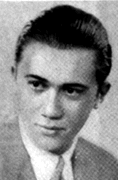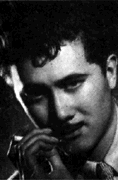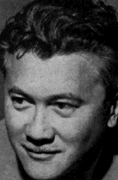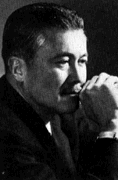Biography of Leslie Charteris
Born Leslie Charles Bowyer Yin in Singapore (then a British colony) on May
12, 1907, Leslie legally changed his name by deed-poll to Leslie Charteris
in 1926. He died in Windsor, England on April 15, 1993 at age 85. His father,
Dr. S. C. Yin was a wealthy Chinese surgeon, a direct descendant of the
emperors of China during the Shang dynasty; his mother was English.
But instead of rehashing the entire The Saint and Leslie Charteris
by W.O.G. Lofts and Derek Adley--a book every Saint fan should have--I will
quote Charteris' own words to give a little more personal insight into his
life. These quotes come from his own writings about his life, and the sources
are indicated. There have been a number of essays written about Leslie Charteris,
but most of them have at least one or two errors, therefore in this case
it is advisable to publish directly from the source: Leslie Charteris himself.
This section might stray from a direct history of the life and times of
Leslie Charteris, but where would some of the more interesting quotes go?




Leslie Charteris at age 26, 36, 46, and 56, respectively.
Coming to America
From A Letter from the Saint, July 26, 1946
It became increasingly clear to me that America was the Promised Land in
which I should have to seek fun and fortune.
It was 1932 before I had enough money all at one time to figure I could
pay my passage even on a small steamer and arrive with $25 in my pocket,
which the American Consulate declared was the minimum permissible grub steak.
So at last I set out on my great adventure.
I had my first sidelight on another America when I filled out the form for
the ship's manifest. After a lot of routine items about where you were born
and when and why, the questionnaire ended up with "Are you an anarchist?
A polygamist? Do you believe in the overthrow of the Government of the United
States by force?"
It seemed a little unnecessary to ask whether one was an anarchist, since
everybody knew that anarchists could be identified by sight by their untidy
whiskers and the round black bombs with spluttering fuses which they always
carried behind their backs. As for being a polygamist, it seemed slightly
unfair to pick on me when I had read of state visits by quite a large selection
of sultans, rajahs, beys, pashas, and effendis, all of them busy polygamizing
on their home ground with full religious sanction; while I had also the
lingering idea that somebody named Brigham Young was spreading a similar
gospel in Utah. The forcible overthrow of the United States Government was
not on my schedule at the time, but the question did seem rather foolish,
since I could not understand why anyone would expect me to announce it in
advance if it had been. I had yet to learn that a technique was being evolved
of nailing otherwise untouchable gangsters for failing to pay their income
tax; so that on the same basis it might be possible to deport a revolutionist,
not for launching a rebellion, but for making a false affidavit of his intentions.
Also on the boat I saw Lee Tracy in a picture called NIGHT MAYOR, from which
I learned that all American politicians were grafters and spoke in a machine-gun
stream of wisecracks.
But even with this buildup, it was still a case of love at first sight.
The buildings of New York were even taller and shinier than I had imagined
them. I sat in my cheap hotel room on Lexington Avenue and looked across
at the soaring white towers of the Waldorf, so clean and graceful in contrast
to the smoke-grimed stodginess of the London architecture I had just left,
rising sheer and white against the kind of spotless blue sky that London
almost never sees. I was taken to speakeasies where sinister types (now
highly respected head waiters) inspected you coldly from behind iron-grilled
peepholes before they let you in. I got used to the rattling hard-boiled
pace of New York dialogue, which while its wisecracks might not always seem
so fresh and witty as those I had heard from the screen still had a totally
different tempo fro the English. I had an electrifying stimulation from
it, a sense of the same nervous urgency that radiated from the scurrying
crowds on the sidewalks and the pressing honking traffic in the packed streets,
a sense of infinite energy driving at terrific pressure toward unlimited
opportunities. The elemental force of it infected me, spurred me to try
and match the pace, dazzled me with the same prospect of infinite horizons.
I still remember that, even though I have since lost much of my eagerness
for it and chosen for my own taste the more leisured and graceful complacency
of the West. But I was younger then, and no doubt more full of fire and
ambition. It was still a part of my assimilation of and by America.
I liked it even when in March 1933, after this new zest had brought several
unexpected stories out of me and raised my $25 ante to some $500, the now
historic Bank Holiday cut me off again at the roots--with the added excitement
that this accumulating fortune happened to be deposited in the only New
York bank which failed to open again. Because fatefully at that time, when
I was literally down to my last borrowed nickel, I received my first offer
from a Hollywood studio; and with no leeway to haggle about salary I found
myself on my way here [Hollywood] within a couple of days, with my fare
paid by Paramount and a few dollars to eat with on the train borrowed from
an indulgent publisher.
And after that there was another dream come true, and I was driving daily
up to the gates of Paramount Studios with the famous trade mark emblazoned
on a water tank overhanging them, and every time I was reminding myself
a little incredulously "This is Hollywood, and I'm here. This is the
place where they make those pictures, and I'm going in there and be part
of it." It wasn't quite as good as that, because my depression salary
was very small, and the picture I helped to make was very unimportant, and
I went through nearly all the conventional frustrating experiences of all
the other writers who have come to Hollywood expecting fame and glamor.
In fact I became so exasperated that in the end I fought with everyone and
finally pulled out in disgust, swearing that I would never come back; but
that anger too was partly disproportionate and afterwards was partly mellowed
by time, so that eventually a day was bound to come when I'd be back. Days
were always bound to come when America would bring me back; and they did
come, under many pretexts, for trips of inevitably increasing duration.
In 1935, when I came over with Charles Laughton, who was on his way to do
mutiny on the bounty with a full set of uniforms from Captain Bligh's original
tailor, when I was still supercilious about Hollywood and glad that I only
had to talk to the American magazine about some stories. In 1936, when I
flew over on the maiden trip of the Hindenburg, a newspaper correspondent
then, with Webb Miller who was killed in a London blackout and Ralph Barnes
who was shot down over Berlin. In 1937, when I landed in Florida and saw
those Everglades, and then drove across to California and saw everything
in between. In 1938, when I had decided that the only way to see the country
was in a trailer, and I built the trailer which I still have and lived in
it for eighteen months, and learned America from San Diego to the Canadian
border, from Miami to New Jersey, and east to west in between.
After this, there was no possible choice at all, except one which had been
made by my parents a long time ago, and by the Congress of the United States
in 1924, when they enacted the Oriental Exclusion Act, defining Orientals
as all people with 50% or more of "Oriental blood" and forbidding
them admittance to the Promised Land.
The "Oriental blood", or any other kind of blood definition, seems
to have been pretty well washed out during the last war's campaign for blood
donors; but the racial distinction never does seem to have been settled,
since I still get form inviting me to state my "race", and I still
don't know the answer, because there are no stock names for a 50-50 split
and in the case of a tie it seems that no prizes are awarded.
In 1939 I hadn't even realized that this was an immigration problem. By
that time I had lost most of my English accent, both in speech and thinking.
My dearest friends were scattered about America from coast to coast, and
England was the country I only visited, without too much enjoyment, and
feeling more of a stranger there every time. So that when I made my last
trip to London, armed with a letter from the late General Theodore Roosevelt
to Ambassador Joe Kennedy to expedite my quota application, I had no idea
that there would be any hitch and I'm sure it hadn't occurred to Ted either.
I came back as before, on one of those transient visas, good for another
six months at home; and that seemed to be the hopeless end of that. It hadn't
occurred to me that the laws of a country like this might be flexible, since
there is no such thing as a flexible law in England; or that the Congress
of the United States might take time out to review an individual case. And
yet one day there was a bill introduced by the late Senator Hiram Johnson,
which after more than a year of kicking about between the two Houses and
their committees finally took the following form.
[The act was signed by President F.D. Roosevelt on December 8, 1942, and
allowed Leslie Charteris and his daughter, Patricia Ann Charteris permanent
residence, and therefore the right to eventually become citizens of the
United States. Further in this letter, Charteris went on to talk about his
quest for citizenship, and ended with the following paragraphs]
This morning, in the company of a crowd of other candidates who must have
started with the same aspirations and passed the same tests, I was shepherded
before a judge, and together we repeated: "I pledge allegiance to the
flag of the United States and to the Republic for which it stands, one Nation
indivisible, with liberty and justice for all."
I am an American.
How To Pronounce My Name
From A Letter from the Saint, May 9, 1946
Since I am sure you will all want to tell your friends about this wonderful
service, [A Letter from the Saint] and since my name occurs so often in
any intelligent conversation anyhow, this seems like a good time to start
you off on the right foot in the matter of pronouncing my name.
When I picked myself this distinguished cognomen it never occurred to me
that such a superficially simple arrangement of letters could be so easily
butchered and mutilated. It is somewhat humiliating for what should by this
time be a household word to hear itself so frequently pronounced as "Charteers",
"Sharteers", "Shartroos", and worse.
There is no trick to it at all if you relax. The "Chart" is pronounced
exactly like "chart", the thing you steer boats with. The "er"
is pronounced exactly like "er". Put them together and you get
"Charter", pronounced as in Magna. The "is" is the only
catch, and should be articulated by placing the tip of the tongue behind
the front teeth, if any, and exhaling in a sharply sibilant manner which
should not however attain the dimensions of a whistle. If either tongue
or teeth are not available, a fresh soda siphon may be employed to produce
a similar effect.
For the benefit of those really fascinated by the subject, the British aristocracy,
several of whom dangled from this family tree, pronounced the name, in their
quaint way, as "Charters"; the "i" being silent as in
monocle.
Saintly Mix-ups
From the introduction to The Saint Mystery Magazine (USA), Aug 1959
To our roster of pen pals we have recently added Ethel G. Roberts of Orford,
N.H., who wrote us the other day in part as follows:
...Stopping off in Princeton, N.J. on my way, I went into THE Book Shop
and asked for "The Saint." Answer: "We do not carry any religious
books."
Reading this, I was reminded of another letter I received once, from Sister
Something-or-other of a certain Convent, asking if I would be generous enough
to donate one of my Saint books to their library. I was glad to send her
a sample; but she never acknowledged it, and I sometimes have grave doubts
whether it was the type of literature she was expecting.
The Lost Charteris Manuscripts
From A Letter from the Saint, January 23, 1947
It should cause no surprise that anyone so lazy as myself should be economical
to the point of miserliness with everything he writes. That is why no future
students of the Charteris line are likely to come upon many sensational
discoveries in the form of lost manuscripts or forgotten stories. Everything
I write is designed to be milked to the last drop of revenue. A short story
or a novelette that appears first in a magazine is inescapably doomed to
be hoarded with others of its kind until there are enough of them to be
brought out in a collected volume, which in turn we propose to keep reprinting
at intervals so long as anyone will buy it. In this manner every job is
practically sentences to immortality before the first word goes on paper.
If I didn't see its place in the Saga when I planned it, I probably wouldn't
write it at all.
After the Saint was well established, I even went back over my earlier writings
and selected those which I still wanted to perpetuate, and shamelessly rewrote
them as Saint stories and included them in certain books. I shall not tell
you which they are, since perhaps I ought to leave some puzzles for the
commentators; but my defense, if I need one at all, is that if I had created
the Saint before I wrote those stories they would certainly have revolved
around the Saint instead of around the experimental character who preceded
him. Others, amounting to four novels and a mess of short stories which
I did not think worth preserving, I have done my best to eliminate from
the record by refusing all requests for permission to reprint them, and
I hope I have done a good job of making them hard to unearth. The effort
would certainly not be justified by the quality of the material--which I
think you can safely take my word for, since you have never known me to
be modest about my own work when I like it.
But there are just a few stories which I genuinely regret losing, which
were lost by force of circumstance and which I can do nothing about. They
were all original Saint stories too, and I was thinking of them while working
on a new collection of shorter pieces which I am now trying to finish up.
This then, for the benefit of prospective researchers and bibliographers,
is the definitive word on the missing manuscripts of Charteris, and should
save everyone a great deal of trouble.
[NOTE: Some of the stories were later either found or rewritten from memory, including
The Golden Journey, The Intemperate Reformer, and The Spanish Cow]
Love and The Saint
From Meet The Saint, published in Meet the Detective, 1935
About the Saint's amorous adventures, by the way, I can't speak so brazenly.
Quite frequently I get letters from perplexed readers asking me to explain
his position, and I find them very difficult to answer. In his first volume
he did get very deeply compromised with a certain Patricia Holm, and since
then she seems to have been permanently absorbed into his entourage, at
least in so far as she's usually ready to bob up whenever he needs a feminine
accomplice. But he also seems to forget her quite easily for whole books
as a time, while he cheerfully improves the shining hour with some other
attractive damsel who has a part in the story which is occupying his attention
at the moment. And he's not so platonic, either.
I cannot explain this. And I don't propose to try. But I'm afraid it will
keep on happening.
Perhaps it has something to do with his philosophy of adventure and danger.
I think I should like to end up on that note. He believes in romance. He
isn't merely going through the mechanical movements of a man in an exciting
situation. He is, vitally and positively squeezing the last drop of delight
from living the best life he knows in the best way he can. And because of
that he is finding intensified delight in the more ordinary things around
him. If I could feel that some of the people reading about him were infected,
even in a lesser degree, with the same supreme excitement of living, I should
feel I hadn't done a bad job.
Portrayals of The Saint
From the introduction to The Saint Mystery Magazine (USA), May 1960
I shall now state again, once and for all, that the Saint could have been
superbly played, albeit in different styles, by such actors as Ronald Colman,
Cary Grant, or Doug Fairbanks Jr.; and if this is my conception of the role,
it should be obvious that such totally different types as Louis Hayward
and George Sanders were hopelessly miscast. How Felix Marten, the French
actor who has just finished the first all-French Saint picture, will turn
out, I'm now waiting to see. In due course I shall tell you what I think,
and this is one subject on which all other opinions are predestined for
the wastebasket.
I can be wrong about lots of things; but on all matters concerning Simon
Templar I can cheerfully proclaim myself the one and only infallible incontrovertible
expert on earth. And this I shall continue to maintain, so help me.
|
|




